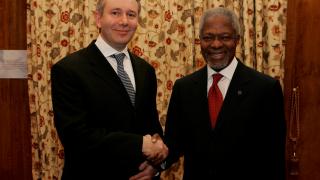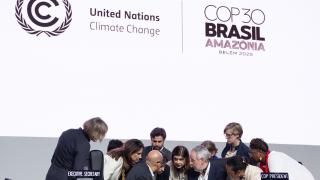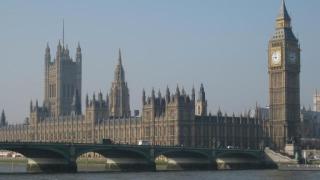
Sam Daws served as First Officer to Kofi Annan from 2000 to 2003 and as UNA-UK Executive Director from 2004 to 2010.
The death of Kofi Annan is a real loss to the world, an inspirational leader who steered the UN during a turbulent decade, and advanced the causes of peace, development and human rights. As an individual he was a person of great warmth, intelligence, patience, and above all, integrity. I had the privilege of working directly for him for a couple of years as a First Officer, notetaking for him in New York and on international trips, as well as working for his two directors of communication, Shashi Tharoor and Edward Mortimer, from 2000 to 2003.
An enduring memory was how he would greet the cleaner in exactly the same way that he would say hello a head of state – his humility and humanity were always evident, and he had a high quotient of ‘emotional intelligence’. Those years were a see-saw of highs and lows on the 38th floor – he brokered the Millennium Summit in 2000 which paved the way for the pathbreaking UN Millennium Development Goals; then the 9/11 attacks shook New York and the world, followed a year later by the looming and then divisive war in Iraq. Also during this time, he (and the UN) were awarded the Nobel Peace Prize and he was successfully re-elected for a second term. Never once did I see him raise his temper – if he was annoyed he would go quiet instead – but that was rare. I sensed he recognised anger in itself would achieve nothing and he focussed instead on what needed to be done next.
He maintained a remarkable equanimity, even during the toughest times. He once told me that his favourite book was Siddhartha by Hermann Hesse. I certainly think there are parallels between Annan and this fictional account of the early life of the Buddha. In the book Siddhartha witnessed both severe poverty and mixed with princes, and as a consequence forged a principled middle path between these two extremes by which to live his life. Annan understood first-hand the terrible consequences of poverty and conflict on the African continent and beyond, and used his powers of diplomacy, discernment and tact – combined with a rugged firmness, to convince and if necessary to shame today’s rulers – heads of state and government – to respond to a higher calling. He doggedly pursued the principles of the UN Charter while carefully navigating the path of what was politically possible.
He saw ending endemic poverty – especially in Africa – as a moral imperative and a personal priority. But his legacy extends well beyond the contributions he made to the MDGs. His integrity and humility meant that he owned the UN’s failures in Rwanda and Srebrenica, but he also made sure that the remedies recognised a need to correct both the failures of states to provide adequate mandates and resources, as well as the need to improve Secretariat implementation. His tenure saw an overhaul of complex peace operations and a reduction in global conflict. And in the realm of human rights he convinced disparate member states that achieving peace and development was impossible without respect for human rights and the rule of law. He convinced developing and developed country governments alike that state sovereignty had limits which required an international response to protect civilians when states were found unwilling or unable to do so.
He was also the first Secretary-General to fully recognise the need to forge partnerships – including with the private sector, civil society and foundations – to address problems that no state, however large, can solve on its own. He referred to such “problems without passports” as requiring solutions which transcend borders. He also believed in the imperative of strategically communicating why the UN matters. As a result, he was a great friend and partner to UNA-UK and the wider World Federation of UN Associations. He came regularly to London, taking time to personally meet UNA staff and interns. And he gave a remarkable speech to UNA-UK in Central Hall Westminster to mark the UN’s 60th anniversary.
The world has lost a pillar of multilateralism, and a person who truly embodied the principles of the UN Charter. He argued passionately for a strong and effective United Nations, and a more peaceful, just and sustainable world. That world is a much better place for having had Kofi Annan pass through it these last 80 years.
Photo: Kofi Annan meets with Sam Daws after speaking at Central Hall, Westminster to mark the UN's 60th anniversary Credit: Daws






